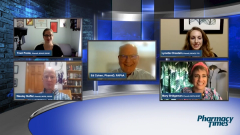
Vaccination Advocation Amid Misinformation
Pharmacists discuss the impacts of inaccuracy on vaccine hesitancy and offer communication strategies for conversations with patients.
Episodes in this series

Ed Cohen, PharmD, FAPhA: That brings a thought to my mind about required vs recommended vaccines. Traci, as a mom, your children get their required immunizations based on a schedule. But as soon as you’re 18, the requirements go away and then it’s all just recommended. We see challenges when it’s left to our own decision-making. Recommended means just that. It isn’t required. Why do I need to take it? As pharmacists, when we’re engaging with patients—Mary, you articulated one way. Lynette or any of the others, do you have any thoughts around how we overcome that thought process? If it’s only recommended, do I need it?
Wesley Nuffer, PharmD, BCPS, CDCES: I can speak to that. So much of this is built on trust, so the question continues to come up, especially around the misinformation or the pick-your-media as far as what you should believe about COVID-19 vaccines or vaccinations in general. I believe that the population we work with looks to the medical professionals to provide guidance when social media is saying one thing and the news broadcaster is telling you something. I agree with you. The biggest problem with the recommended language is that the easiest thing to do is nothing. If I’m on the fence about it, I can continue to be on the fence and never go out and do this.
It’s important to be an advocate, build trust, and have conversations around other [individuals] around risk. I like to use the idea of cocooning with our scheduled vaccines. Certain kids with immunocompromised diseases can’t get the MMR [measles-mumps-rubella] vaccine, but if they get exposed to measles, it could kill them. Sometimes, when you’re talking to folks who say, “With my kid, it’s better for them to not get vaccinated,” if you let them know that it isn’t just about that person’s life, it’s also about everyone around them and taking a public health approach about how we’re all helping each other, that can reframe the perspective a little. Sometimes it can’t. But we serve as tremendous advocates for our patient base and we have an obligation to have these conversations frequently and provide as much good information as possible.
Ed Cohen, PharmD, FAPhA: You bring up a good point about misinformation. Lynette, I’m coming back to you with the same question. There’s a lot of misinformation on COVID-19. There have been multiple COVID-19 offerings of immunizations, the series, and such. How has all of this conversation impacted the public’s understanding and perception of vaccines in general? We’re all touching on this in different ways. The same question may be repeated, but it’s worth getting everyone’s opinion on this and stating it in different ways. Because as patients come to the pharmacy, they’re all asking and expressing different things to us as well.
Lynette Chastain, PharmD, BCACP, TTS: Patients are very knowledgeable about vaccines. They’ve heard about them on media. They know much more than we did 2 years ago. When they come to me now, they have thoughts and are prepared with their take on why they should or shouldn’t receive the immunization. Before it’s recommended, they want to know the efficacy. “Is it going to be effective for the new strain?” They’re asking me very good questions. I need to be prepared to answer those questions. There are some good resources. The CDC has its COVID-19 data tracker, which shows the death rate and hospitalization rate in those who are vaccinated vs unvaccinated. They come in graph form, so you can show that to patients and say, “This is why I encourage my family to get immunized.” Always ask for permission before you share information as well so that they don’t feel like you’re trying to not hear what they’re saying.
Transcript edited for clarity.
Newsletter
Stay informed on drug updates, treatment guidelines, and pharmacy practice trends—subscribe to Pharmacy Times for weekly clinical insights.

























